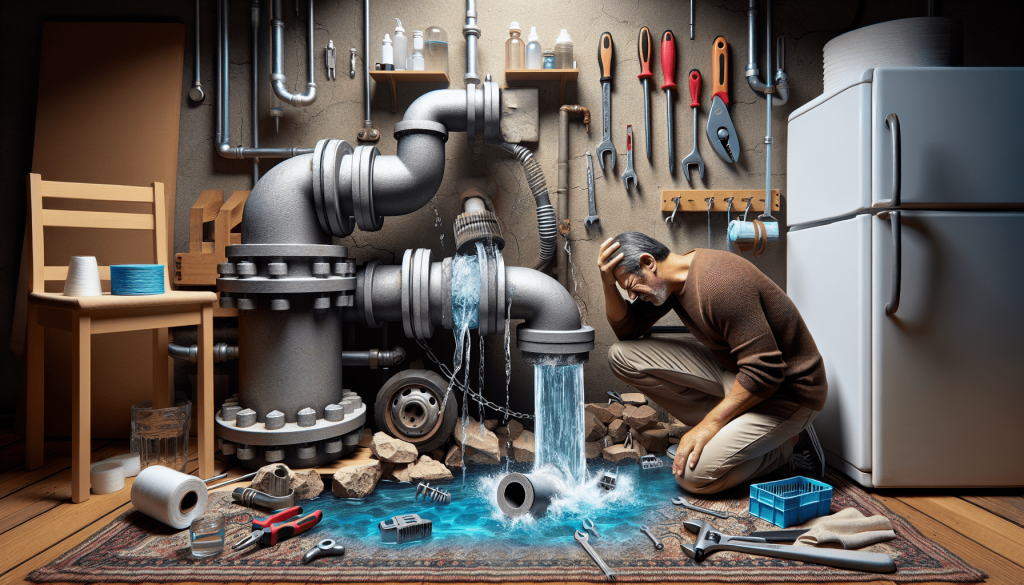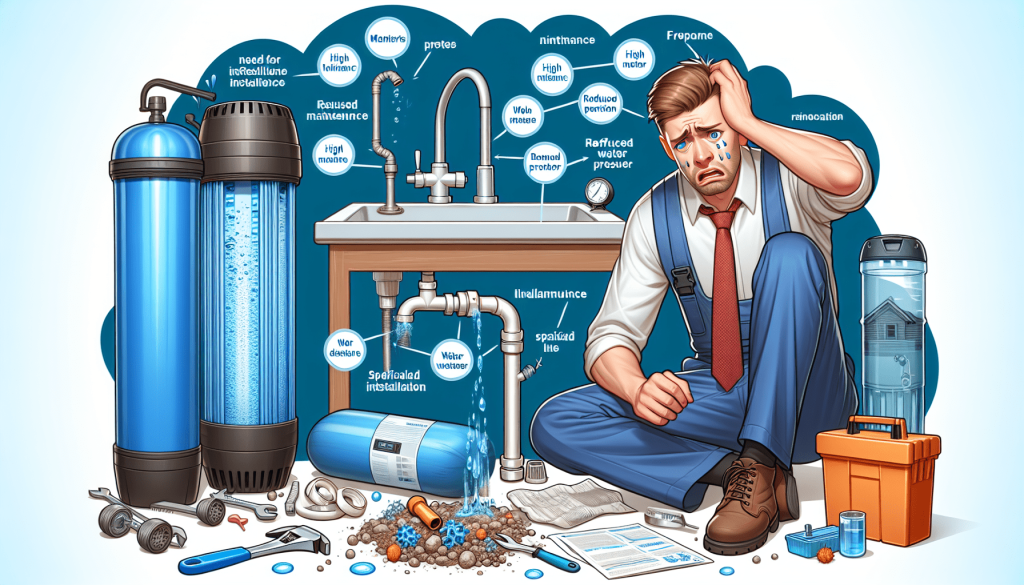Are you considering installing a whole house water filter but unsure of its potential drawbacks? Look no further! This article aims to shed light on the disadvantages of whole house water filters, helping you make an informed decision. From increased installation costs to regular maintenance requirements, we will explore the downsides of this filtration system. By the end, you will have a clear understanding of the potential challenges associated with whole house water filters and whether they are the right choice for you. So, let’s dive in and explore the disadvantages together!
1. High Cost
Initial investment
One of the main disadvantages of a whole house water filter is the high cost associated with it. When installing a whole house water filter, you will need to make a significant initial investment. This includes the cost of the filter itself, as well as any additional equipment that may be needed for installation. The price can vary widely depending on the size and type of filter you choose, but it is important to budget and plan accordingly.
Maintenance costs
In addition to the initial investment, there are also ongoing maintenance costs associated with a whole house water filter. Filters need to be replaced periodically, and these replacement filters can be quite expensive. The frequency of filter replacement will depend on the type of system you have and the quality of your water source. It is important to factor in these costs when considering a whole house water filter.
Replacement costs
Not only do you have to budget for the maintenance costs of replacing filters, but you also need to consider the potential replacement costs of the entire system. While whole house water filters are generally durable and long-lasting, there may be instances where the entire unit needs to be replaced. This could be due to damage or wear and tear over time. These replacement costs can be significant and should be taken into account when deciding to invest in a whole house water filter.
2. Limited Filter Efficiency
Inability to remove certain contaminants
While whole house water filters are designed to remove a wide range of contaminants, there may be certain contaminants that they are unable to effectively remove. Some filters may not be equipped to deal with specific types of contaminants such as bacteria, viruses, or certain chemicals. It is important to research and choose a filter that is capable of addressing the specific contaminants present in your water source.
Decreased effectiveness over time
Another disadvantage of whole house water filters is that their effectiveness may decrease over time. As the filter accumulates more contaminants, it may become clogged and less efficient at removing impurities from your water. Regular maintenance and filter replacement are crucial to ensure that your filter continues to perform at an optimal level.
Limited ability to treat specific water issues
Certain water issues may require specialized treatment that a whole house water filter may not be able to provide. For example, if you have hard water or high levels of iron in your water, a whole house water filter may not be sufficient to fully address these issues. In such cases, additional treatment methods may be necessary to achieve the desired water quality.

3. Complex Installation
Requirement of professional installation
Installing a whole house water filter can be a complex process that often requires professional assistance. This adds to the overall cost of the system and may require scheduling and coordinating with a professional installer. It is important to consider the added time and effort involved in the installation process when deciding to invest in a whole house water filter.
Inconvenience during installation
During the installation process, there may be some inconvenience and disruption to your daily routine. The water supply to your house may need to be temporarily shut off, and you may need to make alternative arrangements for water usage during the installation. This can be inconvenient, especially if the installation process takes longer than anticipated.
Need for additional space
A whole house water filter system typically requires a dedicated space for installation. Depending on the size and type of system you choose, this may require additional space in your home, such as a utility room or basement. It is important to consider whether you have the necessary space available before investing in a whole house water filter.
4. Reduced Water Pressure
Potential decrease in water pressure
One potential disadvantage of a whole house water filter is a potential decrease in water pressure. As water passes through the filter, it may experience some resistance, resulting in a decrease in water pressure throughout the house. While this decrease may be minimal, it can still impact the overall water flow and pressure in your home.
Impact on simultaneous water usage
In households where multiple sources of water are used simultaneously, such as running the dishwasher while taking a shower, a whole house water filter may further impact water pressure. The filter may limit the amount of water that can be used at the same time, leading to reduced water flow and potential inconvenience. It is important to consider your household’s water usage habits and needs when deciding on a whole house water filter.

5. Incompatible with Certain Water Sources
Well water with high sediment levels
Whole house water filters may not be compatible with water sources that have high sediment levels, such as well water. Sediment can clog the filter quickly and reduce its effectiveness. In such cases, additional sediment filters or pre-filters may be required to protect the whole house water filter and ensure it performs optimally.
Water with high iron content
Water with high iron content can present challenges for whole house water filters. Iron can cause staining, unpleasant odors, and affect the taste of the water. While some whole house water filters can handle moderate levels of iron, high iron content may require additional treatment methods like a dedicated iron filter or water softener.
Water with low pH levels
Low pH water, also known as acidic water, can pose challenges for whole house water filters. Acidic water can corrode pipes and plumbing fixtures, and it may also affect the effectiveness of the filter itself. Additional treatment methods, such as a neutralizing filter or chemical injection system, may be needed to address low pH levels in the water.
6. Risk of Bacterial Growth
Standing water in the filter
One potential risk associated with whole house water filters is the presence of standing water within the filter. If the filter is not properly maintained or if the system experiences frequent interruptions in water flow, standing water can occur. This stagnant water provides an ideal breeding ground for bacteria and other microorganisms.
Opportunity for bacterial growth
The presence of standing water in the filter can create the opportunity for bacterial growth. Bacteria can multiply and thrive in a moist, warm environment, potentially leading to water contamination. It is important to regularly clean and maintain the whole house water filter to minimize the risk of bacterial growth.
Potential health risks
Bacterial growth in a whole house water filter can pose potential health risks. If the contaminated water is consumed or used for bathing, it can lead to illnesses and infections. It is crucial to regularly monitor the condition of the filter and promptly address any signs of bacterial growth to safeguard your health and the health of your household.

7. Inconvenient Filter Replacement
Frequency of filter replacement
Regular filter replacement is necessary to maintain the effectiveness of a whole house water filter. However, the frequency of filter replacement can vary depending on the filter type, water quality, and usage. Some filters may require replacement every few months, while others can last for several years. Being aware of the specific requirements of your filter and scheduling regular replacements can help ensure optimal filtration.
Lengthy process and downtime
Replacing the filter in a whole house water filter system can be a lengthy and time-consuming process. It may involve shutting off the water supply, dismantling and removing the old filter, and installing the new one. This can result in downtime during which water usage is temporarily interrupted. It is important to plan for this inconvenience and ensure you have alternative water sources available during the replacement process.
Potential for forgetting or neglecting replacement
With the busy demands of daily life, there is a potential for forgetting or neglecting the timely replacement of the whole house water filter. This can lead to decreased filter efficiency and compromised water quality. Maintaining a schedule and setting reminders can help ensure regular filter replacements and a continuous supply of clean water.
8. Dependency on Electricity
Need for electricity to run the filter system
Some whole house water filter systems require electricity to run. This dependency on electricity means that the filter will not function during power outages or in areas with unreliable electricity supply. It is important to consider the availability and reliability of electricity in your area when considering a whole house water filter.
Risks during power outages
During power outages, a whole house water filter system that relies on electricity may be rendered useless. This can leave you without access to filtered water until the power is restored. In areas prone to frequent power outages, it may be necessary to have alternative water sources or backup power options to ensure a continuous supply of clean water.

9. Ineffective Against Hard Water
Insufficient removal of minerals
Whole house water filters may not be fully effective in removing minerals present in hard water. While some filters can alleviate the effects of hard water, they may not completely remove minerals such as calcium and magnesium. The presence of these minerals can still result in scale buildup and affect the performance of appliances and plumbing fixtures.
Potential for scale buildup
Minerals present in hard water can cause scale buildup in pipes, water heaters, and other plumbing fixtures. While whole house water filters can help reduce the effects of hard water, they may not prevent scale formation entirely. Additional treatment methods like water softeners or anti-scale devices may be needed to address the issue of scale buildup.
Damaging effects on appliances and plumbing
Scale buildup caused by hard water can have damaging effects on appliances such as dishwashers, washing machines, and water heaters. The buildup can lead to decreased efficiency, increased energy consumption, and potentially costly repairs or replacements. It is important to consider the impact of hard water on appliances and plumbing when evaluating the effectiveness of a whole house water filter.
10. Environmental Impact
Wastewater generated during backwashing
Whole house water filters often require periodic backwashing to clean and flush out accumulated impurities from the filter. This backwashing process can generate a significant amount of wastewater, which may contain contaminants and pollutants. Proper disposal of this wastewater is essential to minimize the environmental impact.
Disposal of used filters
As whole house water filters require regular filter replacements, the disposal of used filters can contribute to waste generation. Some filters may contain non-biodegradable materials that can have a negative impact on the environment. Proper disposal methods, such as recycling or disposing of filters according to local regulations, should be followed to minimize environmental harm.
Use of non-biodegradable materials
Whole house water filters often consist of various components and materials, some of which may be non-biodegradable. These materials can contribute to environmental pollution and waste accumulation. It is important to choose filters that are made from eco-friendly and sustainable materials whenever possible to minimize the environmental impact.
In conclusion, while whole house water filters offer many benefits in terms of providing clean and filtered water throughout your home, they also come with several disadvantages. The high cost, limited filter efficiency, complex installation process, potential decrease in water pressure, incompatibility with certain water sources, risk of bacterial growth, inconvenient filter replacement, dependency on electricity, ineffective against hard water, and environmental impact are all important factors to consider when deciding whether a whole house water filter is the right choice for your household.



